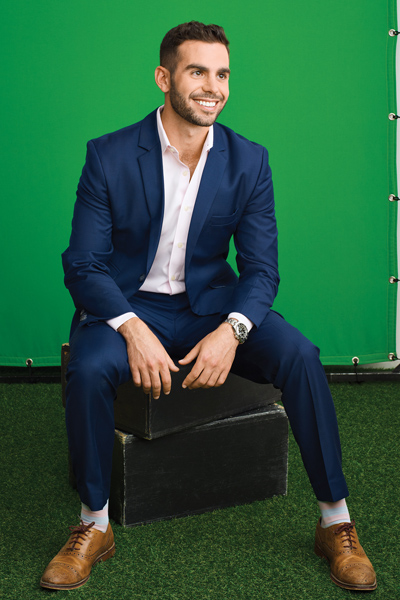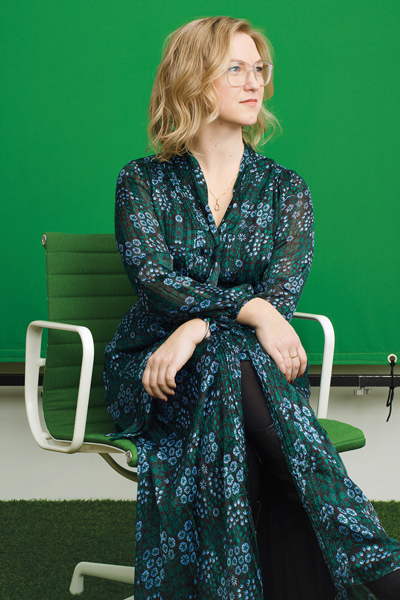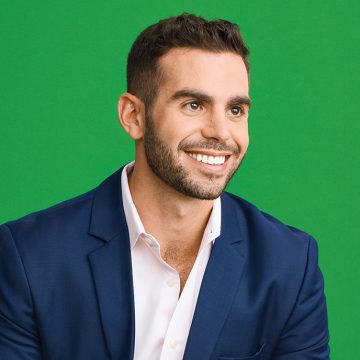Cannabis is the oldest new industry going. We’ve been consuming the plant for at least 10,000 years, but we’ve never done it quite the way we’re doing it today. Last October, the federal Cannabis Act went into effect, making recreational weed legal countrywide. In a flash, a business that was once the domain of hippie growers and back-alley dealers is now passing into the hands of horticulturalists, retailers, lifestyle brands and savvy investors. And all of them are looking for lawyers.
But there isn’t a cohort of established lawyers who have worked in the weed industry for decades. So when cannabis companies seek legal advice, they don’t need to hear from the most tenured partner in the room. The junior associate is just as likely to be the expert. Which is why, if you look across Bay Street, a steady stream of corporate associates has left private practice to work in the world of legal pot. Meet three enterprising lawyers who did just that.

Michael Garbuz
Role: Principal at Vision Advisory Inc.
Former Bay Street Role: Articling student at Cassels Brock & Blackwell LLP
Year of Call: 2017
As an articling student at Cassels Brock & Blackwell LLP, in 2015, Michael Garbuz helped the cannabis private-equity company CannaRoyalty — now called Origin House — launch its initial public offering. It was the start of a new obsession. “I had no idea there was so much potential in the industry,” he says. “I knew there were some medical products in Canada, but I didn’t know about the other crazy products, like patches, creams and sublinguals.”
He learned all he could about the industry. He pored over investment-banking reports and studied the complex regulatory environment. Within months, he was the office expert. “I was put in front of a huge number of cannabis clients,” says Garbuz. “At first, people were, like, ‘Why are you in this meeting?’ Then I would speak my mind, and they would listen.”
At the end of his articling term, Garbuz was hired back. Most lawyers use the period between articling and starting as an associate to step away from work, but he decided to accept a short-term consulting contract with CannaRoyalty, his former client. The company was investing in infrastructure, intellectual property and retail outlets. Garbuz would fly across the continent, meet with CEOs and hammer out deals. “I learned that I didn’t want to just give legal advice,” he says. “I wanted to drive business.” By the end of the summer, he had decided not to return to Cassels.
Garbuz joined CannaRoyalty as legal counsel and its head of corporate strategy. During his first year at the company, the number of employees ballooned from 10 to more than 200. It also moved many of its operations to California, shifting the company’s centre of power. So last August, Garbuz quit and started a consulting firm, Vision Advisory. He now helps cannabis clients — retailers, producers, brands — any way he can. “I’ve had phone calls in which people ask me, ‘What do you actually do?’ My answer: ‘What do you need to get done?’”
In the cannabis world, companies are so young that they need a lot of help: to build a management team, to meet with investors and to connect with corporate partners that can move their product to market. Garbuz helps companies achieve these milestones. He also warns them about potential regulatory pitfalls. He no longer works primarily as a lawyer, but his legal knowledge comes in handy.
Garbuz is amazed by his career. At 28, he owns his own business and holds equity in several companies. He also recently moved in with his girlfriend, Sarah Firestone, a 3L at the University of Toronto. As he puts it: “I feel like I’m living 10 lives at once.”

Sony Gokhale
Role: General Counsel at The Supreme Cannabis Company
Former Bay Street role: Counsel at Osler, Hoskin & Harcourt LLP
Year of call: 2007
Sony Gokhale has always been drawn to innovation. In 2011, after a two-year stint at BlackBerry, she joined the technology group at Osler, Hoskin and Harcourt LLP. At the time, most financial institutions were launching mobile-payment apps, so customers could buy things remotely via smartphone. Gokhale helped structure partnerships — between banks, tech companies and software producers — that could bring such products to market. “Every day,” she says, “I was discovering something new.”
In 2017, Gokhale met with two higherups at the Toronto-based Supreme Cannabis Company. There was Nav Dhaliwal (the current CEO) and John Fowler (the founder
and president). She already knew Fowler, who, five years earlier, had summered at Sherrard Kuzz LLP, where her husband, Sundeep, works as a labour and employment
lawyer.
At the time of the meeting, prohibition was about to end. And Supreme — which invests in the cannabis sector and serves as a parent company to other organizations — was set to expand. For that, it needed an in-house lawyer. Gokhale jumped at the chance to work in a new, cutting-edge industry. In January 2018, she joined the company as its first general counsel.
Her first year on the job has been intense. “There’s no expert you can call, no one who’s been in the field for X-number of years and knows it inside out,” says the 37-year-old. “I must gain my own expertise and apply it instantly.”
Cannabis is a tricky business. There are complex regulations on everything from retail (you must hold a licence from Health Canada for every product you sell) to advertising (you basically can’t do it at all). Gokhale has to make sure her company never flouts a single rule. This takes savvy. For instance, Supreme recently partnered with Khalifa Kush Enterprises, allowing it to distribute products under the KKE brand. The “Khalifa” in “Khalifa Kush” is co-founder Wiz Khalifa, the famous rapper and actor. “I came to work and saw that an unaffiliated third-party had posted a video of Wiz Khalifa and Supreme on Facebook,” says Gokhale. In theory, such publicity would be an obvious win, but in the cannabis sector, celebrity endorsements are prohibited. So she immediately asked the company to take the Khalifa video down, a prudent move.
Gokhale has to be a stabilizing force in a rapidly changing industry. “Some lawyers enjoy doing the exact same thing day in and day out,” says Gokhale. “I was never in that category.”

Stefania Zilinskas
Role: General Counsel at Tidal Royalty
Former Bay Street role: Associate at Blake, Cassels & Graydon LLP
Year of call: 2013
“People who go into the law are generally risk-averse,” says Stefania Zilinskas. And, indeed, the first stage of her early career followed a well-worn path: she went to law school at the University of Toronto, articled at Blake, Cassels & Graydon LLP and worked as an associate in the firm’s securities group. A pretty lockstep career.
But then, last summer, a friend put her in touch with Jonathan Beland, the vice-president of corporate development at Tidal Royalty. This company invests in vertically integrated cannabis businesses — that is, those that cultivate, produce and distribute their own product. When Zilinskas met with Beland, Tidal was seeking a general counsel to handle the legal work associated with running a publicly traded company and to help make smart business decisions.
In August, Zilinskas surprised herself: she took the job. But she’s quick to point out that Tidal is the real deal. The organization operates not in a garage but in a Bay Street office reminiscent of the one she left. And Tidal’s business model is super smart: it invests primarily in the American cannabis market. In the United States, pot companies desperately need capital, but, because their product is technically illegal, they struggle to secure financing from U.S. banks. Tidal comes in to save the day.
At Blakes, Zilinskas enjoyed her work but at times chafed against the limitations that junior associates face. “I wasn’t always making decisions, nor was I always facing the client,” she says. For that, she’d need to make partner. “And the road to partnership is getting ever longer and uncertain.”
At Tidal, she makes important choices every day. “Being the general counsel of a public company is not something a fifth-year associate, like me, would normally get to do,” she says. “But because this industry is new — and because Tidal is a new company — I had a rare opportunity.”
In her new role, Zilinskas’s decisions affect where the company puts its money. This is no easy task in the cannabis sector, where it’s hard to separate the hucksters and dreamers from the committed entrepreneurs. Zilinskas scrutinizes potential beneficiaries to ensure they are, in her words, “cleaner than cleaner than clean.”
In the tech industry, people adhere to the Mark Zuckerberg motto, “move fast and break things.” In cannabis, says Zilinskas, “you want to move really fast while being careful not to break anything at all.” Regulators are watching. Law enforcement is, too. “I figure out worst-case scenarios and best-case scenarios,” says Zilinskas. “Then I determine where my comfort level is on that continuum and act accordingly.”
Editor’s Note: Stefania Zilinskas no longer works at Tidal Royalty.
This story is from our Spring 2019 Issue.
Photography by Shalan and Paul


